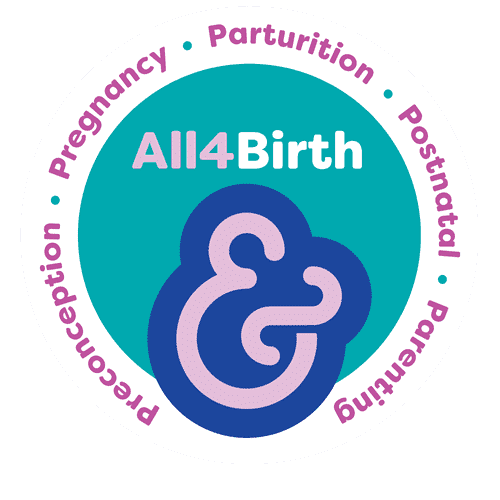Abbie Tomson
Midwife MSc, BSc, Yoga Teacher, Project Lead at All4Birth
@enevlorel @All4Birth
Summary
The human microbiome, consisting of trillions of bacteria, viruses, and fungi that inhabit our bodies, plays a crucial role in our overall health. During pregnancy, the microbiome undergoes significant changes, impacting not only maternal health but also fetal development and the health of the newborn. Understanding how to optimise your microbiome before and during pregnancy can help support a healthy pregnancy journey. Here’s a guide based on guidelines and current evidence on how you can nurture your microbiome for both your well-being and that of your baby.
Understanding the Importance of Microbiome in Pregnancy
The microbiome influences multiple aspects of pregnancy, from helping to modulate immune responses to influencing nutrient absorption and even impacting mental health. Changes in the maternal microbiome can affect the risk of complications such as gestational diabetes, preeclampsia, and preterm birth. Additionally, the initial colonisation of the baby’s microbiome, which is crucial for the child’s future health, is influenced by the mother’s microbiome during pregnancy and delivery.
Gestational Diabetes
A study (Crussell et al 2018) demonstrated significant differences in the gut microbiome composition between pregnant women who developed GDM and those who did not. Specifically, women with GDM showed a decreased abundance of beneficial bacteria such as Faecalibacterium and an increased abundance of Parabacteroides and Clostridium speciesThe altered gut microbiome in women with GDM suggests a potential role of gut bacteria in the pathogenesis of GDM. The presence of specific bacteria might influence metabolic pathways, inflammation, and insulin resistance, contributing to the development of GDM.
Pre-eclampsia
A study (Amarasekara 2015) found that women with preeclampsia had a distinct vaginal microbiome characterized by a lower abundance of Lactobacillus species, which are typically dominant in a healthy vaginal microbiome. This imbalance was associated with an increase in other bacterial species that could contribute to inflammation and adverse pregnancy outcomes. The findings suggest that an altered vaginal microbiome may play a role in the development of preeclampsia. Lactobacillus species are known to maintain vaginal health by producing lactic acid, which inhibits the growth of pathogenic bacteria. A reduction in these beneficial bacteria could lead to an overgrowth of harmful bacteria, triggering inflammatory responses that contribute to preeclampsia.
Pre-term Birth
A study (DiGiulio et al 2015) discovered that the vaginal microbiome of women who delivered preterm was significantly different from those who delivered at term. Specifically, there was a higher prevalence of Ureaplasma and Gardnerella species in women who experienced preterm birth. Additionally, the study observed that changes in the microbiome occurred weeks before the onset of labour, suggesting that microbial composition could be a predictor of preterm birth.
A further study (Romero et al 2014) showed that specific bacterial taxa in the amniotic fluid were associated with preterm labour. The presence of bacteria such as Ureaplasma urealyticum was correlated with intra-amniotic inflammation and adverse pregnancy outcomes, including preterm birth. This inflammation could occur without any detectable infection, indicating a complex interaction between the microbiome and the host immune system.
Dietary Recommendations to Enhance the Microbiome
- Increase Fibre Intake:
High-fibre foods such as fruits, vegetables, legumes, and whole grains feed beneficial gut bacteria. A fibre-rich diet supports the growth of good bacteria, which are essential for both digestion and the production of short-chain fatty acids that regulate inflammation and protect against disease. Different fruits and vegetables provide various types of dietary fibres, which serve as prebiotics—compounds that beneficial gut bacteria ferment and use for growth.
- Include Fermented Foods:
Fermented foods like yoghurt, kefir, sauerkraut, and kimchi contain probiotics, live bacteria that can contribute positively to the maternal gut microbiome. Fermented foods are foods and beverages produced through controlled microbial growth and enzymatic conversions of food components. The process of fermentation typically involves the action of bacteria, yeasts, or other microorganisms, which convert carbohydrates, such as sugars and starches, into alcohol or acids. This process not only preserves the food but also enhances its nutritional properties. Fermented foods often contain prebiotics, which are non-digestible fibres that feed and promote the growth of beneficial gut bacteria. For example, the fibre in sauerkraut and kimchi can stimulate the growth of beneficial bacteria such as Bifidobacteria.
- Diversify Your Diet:
Eating a wide variety of foods can help increase your microbiome’s diversity. A diverse microbiome can ward off pathogens and regulate the body’s immune system. Fruits and vegetables are rich in polyphenols, which are compounds with antioxidant properties that can modulate the gut microbiota composition.
The recommendation to consume 30 different fruits and vegetables per week is based on the idea that dietary diversity can promote a diverse and healthy gut microbiome. This concept is supported by research from the American Gut Project, a large-scale citizen science project studying the human microbiome. Mcdonald et al 2018 found that individuals who consumed more than 30 different types of plant-based foods per week had a more diverse gut microbiome compared to those who consumed fewer than 10 types. The diversity of plant foods was associated with a higher richness of gut bacterial species, which is linked to better gut health and reduced risk of various diseases.
- Limit Sugars and Artificial Sweeteners:
High intake of sugars and artificial sweeteners can promote the growth of harmful bacteria and yeasts in the gut. High sugar intake can promote the growth of pathogenic bacteria and fungi, such as Candida while reducing beneficial bacteria like Lactobacillus and Bifidobacterium. Diets high in refined sugars are associated with decreased microbial diversity, which is a key marker of gut health. Sugar can increase gut permeability, leading to “leaky gut syndrome” where toxins and bacteria enter the bloodstream, triggering inflammation.
Lifestyle Modifications
- Avoid Unnecessary Antibiotics:
Antibiotics, while essential for treating bacterial infections, can have detrimental effects on the gut microbiome. They can reduce microbial diversity, disrupt the balance of beneficial and harmful bacteria, and lead to conditions such as antibiotic-associated diarrhoea (AAD) and increased susceptibility to infections. However, there are strategies to mitigate these harmful effects and support the recovery and resilience of the gut microbiome.
Suez et al. (2018) sought to evaluate the impact of probiotics on the gut microbiome post-antibiotic treatment. Probiotics helped in the rapid recolonisation of the gut with beneficial bacteria and reduced the incidence of antibiotic-associated diarrhoea. Kelly et al. (2015) assessed the effect of prebiotics on gut microbiota during and after antibiotic treatment. Prebiotics promote the growth of beneficial bacteria, such as Bifidobacteria and Lactobacilli, helping to restore the microbiome balance.
Always discuss the need for antibiotics with your healthcare provider.
- Exercise Regularly:
Moderate exercise during pregnancy has been shown to positively influence the gut microbiome. It enhances the growth of beneficial microbial species, improving metabolic health and reducing inflammation. Estaki et al (2016) study found that individuals with higher cardiorespiratory fitness had greater gut microbiome diversity. Specifically, the abundance of butyrate-producing bacteria, which are beneficial for gut health, was higher in fit individuals. This suggests that regular physical activity can enhance the richness and diversity of the gut microbiome, promoting overall gut health.
A study by Davenport (2018) found that physical activity during pregnancy was associated with a reduced risk of excessive weight gain, gestational diabetes, and preeclampsia. These outcomes were linked to improved gut microbiota composition. Exercise helps maintain a healthy gut microbiome during pregnancy, which can contribute to better maternal and fetal health outcomes.
Furthermore, a study by Liu et al (2020) observed that maternal exercise led to a more diverse and stable gut microbiome in offspring, which was associated with improved metabolic health and reduced risk of obesity in the offspring. Maternal exercise can positively shape the infant’s microbiome, promoting better health outcomes from birth.
Probiotic Supplements
While food sources are a natural way to obtain probiotics, supplements can also play a role, especially for specific needs during pregnancy. For instance, some evidence suggests that taking probiotic supplements can reduce the risk of gestational diabetes, preeclampsia, and vaginal infections, and may even impact postpartum depression. However, it’s important to consult with a healthcare provider before starting any probiotic supplement to ensure it is safe and beneficial for your particular health situation.
Several studies have indicated that probiotics can enhance microbial diversity in the gut. Probiotics such as Lactobacillus and Bifidobacterium strains have been shown to increase the abundance of beneficial bacteria and overall microbial diversity. A meta-analysis by Sanders et al. (2019) concluded that probiotics could promote a healthier balance of gut microbiota, though the extent of diversification varies depending on the strains used and the individual’s initial microbiome composition.
During pregnancy, the maternal gut microbiome undergoes significant changes. Probiotic supplementation has been shown to support maternal health by enhancing gut microbiota diversity, reducing the risk of gestational diabetes, and preventing infections. A review by Koren et al. (2012) highlighted that probiotics could positively influence metabolic and immune functions in pregnant women, contributing to a healthier pregnancy.
The maternal microbiome plays a crucial role in shaping the infant’s microbiome. Probiotics taken during pregnancy can be transferred to the infant, potentially promoting a more diverse and resilient microbiome. Research by Dotterud et al. (2010) found that maternal probiotic supplementation led to a reduction in atopic dermatitis and allergic sensitisation in infants, suggesting a beneficial modulation of the infant’s gut microbiome.
Links to other resources
 Books
Books
Brain Health from Birth: Nurturing Brain Development During Pregnancy and the First Year by Rebecca Fett
Real Food for Pregnancy by Lily Nichols
Functional Maternity: Using Functional Medicine and Nutrition to Improve Pregnancy and Childbirth Outcomes by Sarah Thompson
The Microbiome Solution by Dr. Robynne Chutkan
Gut: The Inside Story of Our Body’s Most Underrated Organ by Giulia Enders
Brain Maker: The Power of Gut Microbes to Heal and Protect Your Brain for Life” by Dr. David Perlmutter
 Film Audio and Apps
Film Audio and Apps
Baby Buddy app, created by the Best Beginnings Charity
The Magic Pill (available on Netflix) – Explores the impact of diet on health, including the gut microbiome.
Microbirth – Investigates how the events during childbirth can impact the infant’s microbiome and long-term health.
 Websites
Websites
Baby Buddy App
NHS Guidance on Probiotics and Prebiotics
Microbiome.org
References
- Sanders, M. E., Merenstein, D. J., Reid, G., Gibson, G. R., & Rastall, R. A. (2019). Probiotics and prebiotics in intestinal health and disease: from biology to the clinic. Nature Reviews Gastroenterology & Hepatology, 16(10), 605-616.
- Crusell, M. K. W., Hansen, T. H., Nielsen, T., Allin, K. H., Rühlemann, M. C., Damm, P., … & Pedersen, O. (2018). Gestational diabetes is associated with change in the gut microbiota composition in third trimester of pregnancy and postpartum. Microbiome, 6(1), 89.
- Romero, R., Miranda, J., Chaiworapongsa, T., Korzeniewski, S. J., Chaemsaithong, P., Gotsch, F., … & Yoon, B. H. (2014). Prevalence and clinical significance of sterile intra-amniotic inflammation in patients with preterm labor and intact membranes. American Journal of Reproductive Immunology, 72(5), 458-474
- DiGiulio, D. B., Callahan, B. J., McMurdie, P. J., Costello, E. K., Lyell, D. J., Robaczewska, A., … & Relman, D. A. (2015). Temporal and spatial variation of the human microbiota during pregnancy. Proceedings of the National Academy of Sciences, 112(35), 11060-11065.
- Amarasekara, R., Jayasekara, R. W., Senanayake, H., & Dissanayake, V. H. W. (2015). Microbiome of the placenta in pre-eclampsia. Scientific Reports, 5, 13282.
- McDonald, D., Hyde, E., Debelius, J. W., Morton, J. T., Gonzalez, A., Ackermann, G., … & Knight, R. (2018). American Gut: an open platform for citizen science microbiome research. mSystems, 3(3), e00031-18.
- Hill, C., Guarner, F., Reid, G., Gibson, G. R., Merenstein, D. J., Pot, B., … & Sanders, M. E. (2014). The International Scientific Association for Probiotics and Prebiotics consensus statement on the scope and appropriate use of the term probiotic. Nature Reviews Gastroenterology & Hepatology, 11(8), 506-514.
- Wang, Y., Hoenig, J. D., Malin, K. J., Qamar, S., Petrof, E. O., Sun, J., … & Walker, W. A. (2009). 16S rRNA gene-based analysis of fecal microbiota from preterm infants with and without necrotizing enterocolitis. ISME Journal, 3(8), 944-954.
- Collado, M. C., Delgado, S., Maldonado, A., & Rodríguez, J. M. (2009). Assessment of the bacterial diversity of breast milk of healthy women by quantitative real-time PCR. Letters in Applied Microbiology, 48(5), 523-528.
- Koren,O., Goodrich, J. K., Cullender, T. C., Spor, A., Laitinen, K., Kling Bäckhed, H., … & Ley, R. E. (2012). Host remodeling of the gut microbiome and metabolic changes during pregnancy. Cell, 150(3), 470-480
- Dotterud, C. K., Storrø, O., Johnsen, R., & Øien, T. (2010). Probiotics in pregnant women to prevent allergic disease: a randomized, double-blind trial. British Journal of Dermatology, 163(3), 617-623West, C. E., Jenmalm, M. C., & Prescott, S. L. (2015). The gut microbiota and its role in the development of allergic disease: a wider perspective. Clinical and Experimental Allergy, 45(1), 43-53.
- Ouwehand, A. C. (2017). The role of probiotics in microbiome diversification. Journal of Nutrition, 147(7), 1373-1376.
- Suez, J., Zmora, N., Segal, E., & Elinav, E. (2018). The pros, cons, and many unknowns of probiotics. Nature Medicine, 25(5), 716-729. Link
- Kelly, G. (2008). Inulin-type prebiotics—a review: part 1. Alternative Medicine Review, 13(4), 315-329









